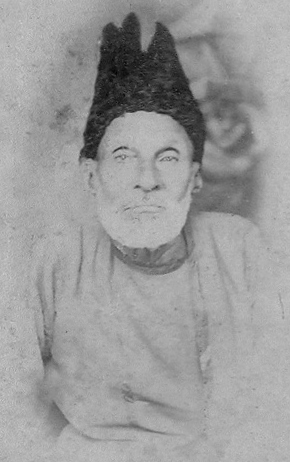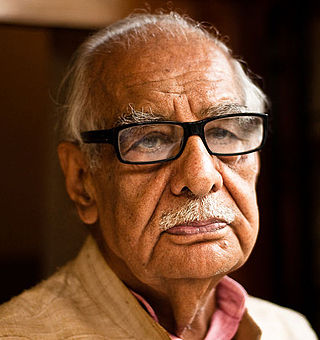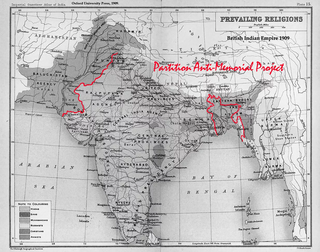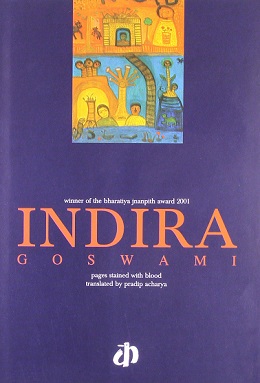
In the Indian subcontinent, hijra are transgender, intersex, or eunuch people who live in communities that follow a kinship system known as the guru-chela system. They are also known as aravani and aruvani, and in Pakistan, khawaja sira.

Jarnail Singh Bhindranwale was a militant. After Operation Bluestar, he posthumously became the leading figure for the Khalistan movement.although he did not personally advocate for a separate Sikh nation.

Ranjit Singh was the founder and first maharaja of the Sikh Empire, in the northwest Indian subcontinent, ruling from 1801 until his death in 1839.

Giani Zail Singh was an Indian politician from Punjab who served as the seventh president of India from 1982 to 1987 and 9th Chief Minister of Punjab. He was the first Sikh to become president.

Khushwant SinghFKC was an Indian author, lawyer, diplomat, journalist and politician. His experience in the 1947 Partition of India inspired him to write Train to Pakistan in 1956, which became his most well-known novel.

Mir Muhammad Taqi, known as Mir Taqi Mir, was an Indian poet, widely regarded as one of the greatest poets in the Urdu language and one of the pioneers who gave shape to modern Urdu. He was one of the principal poets of the Delhi school of the ghazal. His pen name (takhallus) was Mir. He spent the latter part of his life in the court of Asaf-ud-Daulah in Lucknow.

Mirza Asadullah Beg Khan, commonly known as Mirza Ghalib, was an Indian poet. Widely regarded as one of the greatest poets in the Urdu language, he also produced a significant body of work in Persian. Ghalib's poetry often addresses existential struggle, sorrows, and socio-political disturbances, particularly the decline of the Mughal Empire. He spent most of his life in poverty.

Train to Pakistan is a historical novel by writer Khushwant Singh, published in 1956. It recounts the Partition of India in August 1947 through the perspective of Mano Majra, a fictional border village.

Kuldip Nayar was an Indian journalist, syndicated columnist, human rights activist, author and former High Commissioner of India to the United Kingdom noted for his long career as a left-wing political commentator. He was also nominated as a member of the upper house of the Indian Parliament in 1997.

The Partition of India and the associated bloody riots inspired many creative minds in the republics of India, Pakistan, and Bangladesh to create literary/cinematic depictions of this event. While some creations depicted the massacres during the refugee migration, others concentrated on the aftermath of the partition in terms of difficulties faced by the refugees in both side of the border. Even now, more than 60 years after the partition, works of fiction and films are made that relate to the events of partition. W.H. Auden in his poem "Partition" showed the dilemmas of Cyril John Radcliffe, 1st Viscount Radcliffe, responsible for deciding which parts of India went where.
Honorary Magistrate, Sardar Bahadur, Sir Sobha Singh, M.L.C., M.P. was an Indian civil contractor, prominent builder and real estate developer of the modern day Delhi.

Harjinder Singh Jinda was a Sikh militant and one of the two assassins of Arun Vaidya. He was responsible for three high-profile assassinations: Arjan Dass, Lalit Maken and Gen. Vaidya. He along with other members of Khalistan Commando Force participated in Indian history's biggest bank robbery of ₹ 57 million from Punjab National Bank, Miller Gunj branch, Ludhiana to finance the militancy for a separate Sikh state of Khalistan.

Rajinder Singh Bedi was an Indian Urdu writer of the progressive writers' movement and a playwright, who later worked in Hindi cinema as a film director, screenwriter and dialogue writer and he is grandfather to Rajat Bedi and Manek Bedi.
Umrao Jaan Ada is an Urdu novel by Mirza Hadi Ruswa (1857–1931), first published in 1899. It is considered the first Urdu novel by many and tells the story of a tawaif and poet by the same name from 19th century Lucknow, as recounted by her to the author.
Governor Ujjal Singh was an Indian politician who was a participant in the First Round Table Conference, opened officially by King George V on 12 November 1930. Ujjal Singh served as the Finance Minister of Punjab, Governor of Punjab, followed by acting Governor of Tamil Nadu. Prior to this he was one of Pre-Partition Punjab's largest landowners, owning thousands of acres in Hadali, Jaranwala, Mian Channu, Lyallpur, Montgomery, Sargodha and other areas.

Manzur Qadir was a Pakistani jurist and politician who served as the Foreign Minister of Pakistan in the military government of Ayub Khan from 1958 to 1962. Manzur Qadir served as the Chief Justice of Lahore High Court from 1962–1963.

The 1984 anti-Sikh riots, also known as the 1984 Sikh massacre, was a series of organised pogroms against Sikhs in India following the assassination of Indira Gandhi by her Sikh bodyguards. Government estimates project that about 2,800 Sikhs were killed in Delhi and 3,350 nationwide, whilst other sources estimate the number of deaths at about 8,000–17,000.

Pages Stained With Blood (2001) originally published as Tej Aru Dhulire Dhushorito Prishtha is an Assamese novel by Indira Goswami that depicts the gory Sikh pogrom in Delhi as an aftermath of the assassination of the Indian Prime Minister Indira Gandhi in June 1984. First published in Assamese in Goriyoshi literary journal in episodic form, it generated controversy in conservative Assam due to the love story between a professor and a riksha puller.
K. L. Gauba, also known as Kanhaiya Lal Gauba or Khalid Latif Gauba, was an Indian lawyer, writer, politician, and son of Lala Harkishen Lal. Born into a Hindu family, Gauba later converted to Islam and was elected to the Punjab Legislative Assembly by a Muslim constituency. He emigrated to India following partition and died in poverty.
On September 4, 1985, at 9:20 am member of the Delhi Metropolitan Council, close associate of Sanjay Gandhi, and Congress leader Arjun Dass was assassinated by 3 Sikhs in Delhi. The assassins were Harjinder Singh Jinda, Sukhdev Singh Sukha, and another member of Jinda's group. They killed Dass in revenge for his role in the 1984 anti-Sikh riots. Along with Arjun Dass his bodyguard, a constable, was killed and 6 others were injured.















